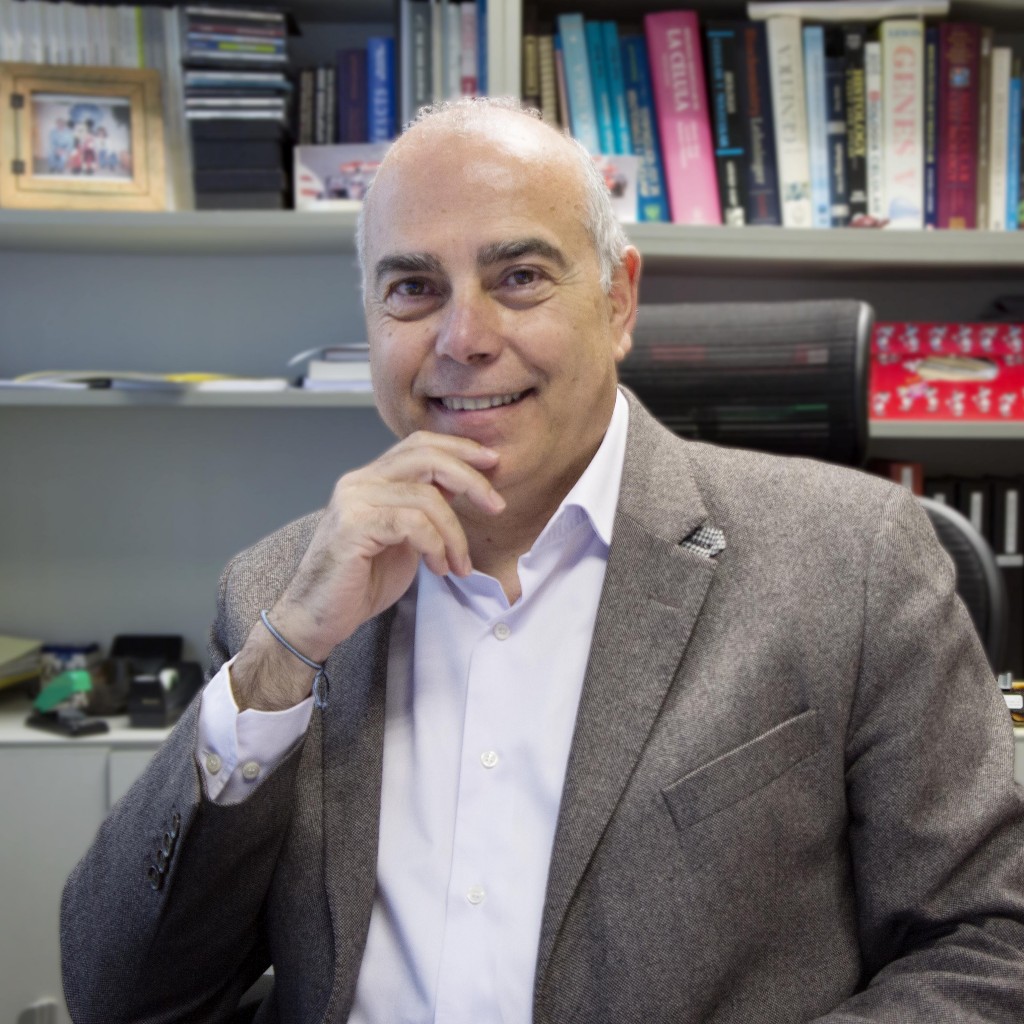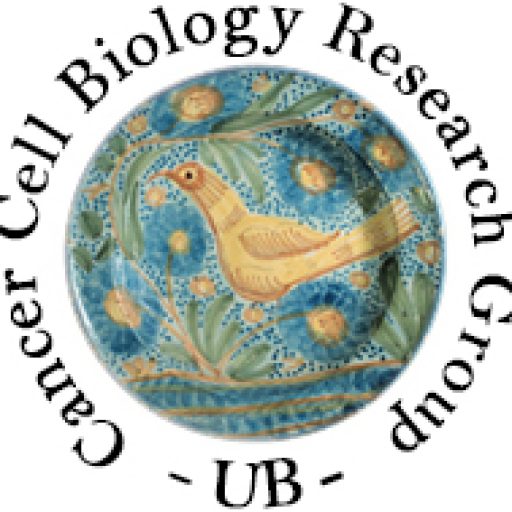
Ricardo Pérez-Tomás, Ph.D. Professor
Biography
Ricardo Pérez-Tomás is Professor of Cell Biology in the Department of Pathology & Experimental Therapeutics (Faculty of Medicine and Health Sciences) at the University of Barcelona, Spain, and a Senior Group leader of the Cancer Cell Biology Research Group.
Ricardo is originally from Murcia in the Spanish South-eastern Region. He obtained his Bachelor degree from Murcia University and then he performed his PhD research with Prof. José Ballesta on comparative neuroendocrine system, first at the Cell Biology Dept. in Murcia and then in the Histochemistry Department (Royal Postgraduate Medical School) at the University of London under the supervision of Prof. J.M. Polak. Afterwards, he performed a postdoctoral research period in the Paterson Institute for Cancer Research in Manchester (United Kingdom) in 1990/91, as well as a one year stay as a visiting professor at the Lineberger Comprehensive Cancer Center, University of North Carolina at Chapell Hill (USA) in 1996/97. In 1998 my research activity on cancer underwent a significant change since my research was focused in cancer cell biology principally in apoptosis; more exactly in the characterization of active molecules with anticancer activity. In collaboration with the research group of Prof. Ernest Giralt (Dept. Organic Chemistry, UB), we were able to characterize and purify the prodigiosin, a pigment originally found in the bacterial strain of Serratia marcescens 2170 (Montaner et al, Br. J. Pharmacol. 2000) with apoptotic activity in cancer cells.
Research interests
During the last years, my research activity has been focused on the characterization of the molecular targets involved in the induction of apoptosis by anion transporters, like prodigiosin and/or obatoclax, as well as in identifing new molecules of therapeutic interest in the treatment of cancer. Some of these research projects were in collaboration with international colleagues like Prof. Mike Levin. Medical School, University of Harvard (USA); Prof. James Lambert, Dept. of Pathology, University of Colorado Denver and Health Science Center, Aurora, Colorado (USA); Prof. Alnawaz Rehemtulla from the Department of Radiation Oncology, University of Michigan Medical School (USA). On the other hand, in order to identify new molecules of therapeutic interest in the treatment of cancer, few years ago my research group started the collaboration with the Organic Chemistry Group lead by Prof. Roberto Quesada at the University of Burgos and with Prof. Phil Gale form the Chemistry Dept. at the University of Southampton (UK). We have already obtained significant results that offer proof of concept for this idea of using anion transporters as cancer chemotherapeutic agents. Our latest results involve the study of marine alkaloid tambjamines as anion transporters. We have found that these compounds and synthetic analogues are potent anion transporters and that their biological activity correlates well with their anion transport properties.
ORCID ID: 0000-0003-3226-1240
Selected Publications
- Targeting autophagy for cancer treatment and tumor chemosensitization. Marta Pérez-Hernández, Alain Arias, David Martínez-García, Ricardo Pérez-Tomás, Roberto Quesada, Vanessa Soto-Cerrato. Cancers, 2019.
- The natural-based antitumor compound T21 decreases survivin levels through potent STAT3 inhibition in lung cancer models. David Martínez-García, Marta Pérez-Hernández, Luís Korrodi-Gregório, Roberto Quesada, Ricard Ramos, Núria Baixeras, Ricardo Pérez-Tomás, Vanessa Soto-Cerrato. Biomolecules, 2019.
- Novel Indole-based Tambjamine-Analogues Induce Apoptotic Lung Cancer Cell Death through p38 Mitogen-Activated Protein Kinase Activation. Manuel-Manresa P, Korrodi-Gregório L, Hernando E, Villanueva A, Martínez-García D, Rodilla AM, Ramos R, Fardilha M, Moya J, Quesada R, Soto-Cerrato V, Pérez-Tomás R. Mol Cancer Ther 2017.
- Synthetic tambjamine analogues induce mitochondrial swelling and lysosomal dysfunction leading to autophagy blockade and cell death in lung cancer. Rodilla AM, Korrodi-Gregório L, Hernando E, Manuel-Manresa P, Quesada R, Pérez-Tomás R and Soto-Cerrato V. Biochemical Pharmacology 2017.
- Facilitated Anion Transport Induces Hyperpolarization of the Cell Membrane that Triggers Differentiation and Cell Death in Cancer Stem Cells. Soto-Cerrato, V.; Manuel-Manresa, P.; Hernando, E.; Calabuig-Fariñas, S.; Martínez-Romero, A.; Fernández-Dueñas, V.; Sahlholm, K.; Knöpfel, T.; García-Valverde, M.; Rodilla, AM.; Jantus-Lewintre, J.; Farràs, R.; Ciruela, F.; Pérez-Tomás R.; Quesada R. Journal of American Chemical Society 2015.
- Photoswitching the Cytotoxic Properties of Platinum(II) Compounds .Andreu Presa, Rosa F. Brissos, Ana Belén Caballero, Ivana Borilovic, Luís Korrodi-Gregório, Ricardo Pérez-Tomás, Olivier Roubeau and Patrick Gamez Angewandte Chemie-International Edition.2015
- Anion transporters and biological systems. Philip A. Gale, Ricardo Pérez-Tomás and Roberto Quesada.Account in Chemical Research. 2013. doi: 10.1021/ ar40001.
- Molecular interactions of prodiginines with the BH3 domain of BCL-2 family members. Ali Hosseini,Margarita E. Fiedler, Vanessa Soto-Cerrato, Roberto Quesada, Ricardo Pérez-Tomás and Victor Guallar.PlosOne. 2013. DOI:10.1371/journal.pone.0057562.
- Identification of dual mTORC1 and mTORC2 inhibitors in melanoma cells:Prodigiosin vs. obatoclax. M.Espona-Fiedler, V. Soto-Cerrato, A. Hosseini, J.M. Lizcano, V. Guallar, R. Quesada,T. Gao and R. Pérez-Tomás.Biochemical Pharmacology. 2012 83:489-496.
- A Novel Kinase Inhibitor of FADD Phosphorylation Chemosensitizes through the Inhibition of NFkB. Katrina A. Schinske, Shyam Nyati, Amjad P. Khan, Terence M. Williams, Timothy D. Johnson,Brian D.Ross, Ricardo Perez Tomas, and Alnawaz Rehemtulla. Molecular Cancer Therapeutics. 2011. 10:1807-1817.
- Structure Activity Relationships in Tripodal Transmembrane Anion Transporters: The Effect of Fluorination. Nathalie Busschaert, Marco Wenzel, Mark E. Light, Paulina Iglesias-Hernandez, Ricardo Pérez-Tomás and Philip A. Gale. Journal of the American Chemical Society. 2011. 133:14136-14148.
- Tambjamine alkaloids and related synthetic analogs: efficient transmebrane anion transporters. Iglesias-Hernández, P.; Moreno, D.; Araujo Javier, A.; Torroba, T.; Pérez-Tomás, R. and Quesada, R. Chemical Communications. 2011. DOI:10.1039/c1c.
- Synthetic prodiginine obatoclax (GX15-070) and related analogues: anion binding, transmembranetransport, and cytotoxicity properties. Díaz de Greñu, B.; Iglesias-Hernández, P.; Espona, M.; Quiñonero,D.; Light, M.E.; Torralba,T.; Pérez-Tomás, R. and Quesada, R. Chemistry-A European Journal. 17: 14074-14083. 2011.
- New insights on the antitumoral properties of prodiginines. Pérez-Tomás, R. and Viñas, M. Current Medicinal Chemistry. 2010. 17:2222-2231.
- Overcoming Drug Resistance by Enhancing Apoptosis of Tumour Cells. Gimenez-Bonafé, P.; Tortosa,A.; Pérez-Tomas, R. Current Cancer Drug Targets. 2009. 9:320-340.
- Understanding authophagy in cell death control. Francesca, P.; Pérez-Tomás,R.; Ambrosio, S.and Tessitore, L.Current Pharmaceutical Design. 2009 16:101-113.


